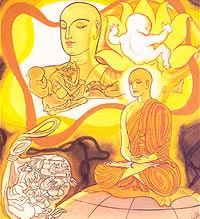30X12 Tuesday LESSON 737 திபிடக முக்கூடைகள் ![]() TIPITAKA from FREE ONLINE eNālāndā Research and Practice UNIVERSITY through http://sarvajan.ambedkar.org-Dhammapada Verse 402 Annatarabrahmana
TIPITAKA from FREE ONLINE eNālāndā Research and Practice UNIVERSITY through http://sarvajan.ambedkar.org-Dhammapada Verse 402 Annatarabrahmana
Vatthu-A brahmana, in this existence realizes the end of dukkha
(i.e., Nibbana), who has laid down the burden (of the khandhas) and
who is free from moral defilements.
Verse 402. A Brahmana Is He Who Has Laid The Burden Aside
Whoso in this world comes to know
cessation of all sorrow,
laid down the burden, freed from bonds,
that one I call a Brahmin True.
Explanation: He has become aware, in this world itself, the
end of suffering. He is unburdened: he has put down the load. He has
got disengaged from the bonds that held him. I call that person a
true brahmana.
Dhammapada Verse 402
Annatarabrahmana
VatthuYo dukkhassa pajanati
idheva khayamattano
pannabharam visamyuttam
tamaham brumi brahmanam.
Verse 402: Him I call a brahmana, who even in
this existence realizes the end of dukkha (i.e., Nibbana), who has laid down the
burden (of the khandhas) and who is free from moral defilements.
The Story of a Certain Brahmin
While residing at the Jetavana
monastery, the Buddha uttered Verse (402) of this book, with reference to a
certain brahmin, whose slave became an arahat.Once, there was a young slave of
a brahmin. One day, fleeing from the house of his master he joined the Order of
the bhikkhus, and in due course, he attained arahatship. On one occasion, while
he went on an alms-round with the Buddha, his former master, the brahmin, saw
him and grabbed him firmly by the robe. When the Buddha asked what the matter
was, the brahmin explained that the young bhikkhu was his slave at one time. To
him the Buddha said, “This bhikkhu has laid down the burden (of the
khandhas).” The brahmin took that to mean that his slave had become an
arahat. So to make sure, he asked the Buddha whether it was true that the young
bhikkhu had become an arahat, and the Buddha confirmed his statement.Then the Buddha spoke in verse as
follows:
Verse 402: Him I call
a brahmana, who even in this existence realizes the end of dukkha
(i.e., Nibbana), who has laid down the burden (of the khandhas) and
who is free from moral defilements.At the end of the discourse the
brahmin attained Sotapatti Fruition.